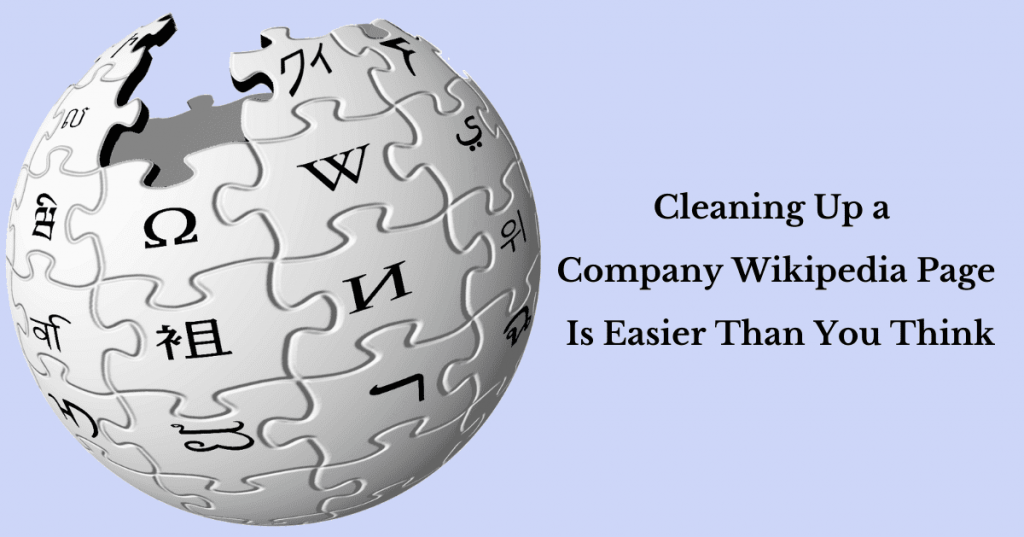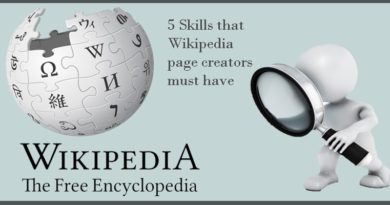Cleaning Up a Company Wikipedia Page Is Easier Than You Think
Company Wikipedia Page Cleaning Up
Wikipedians contribute to Wikipedia pages by editing its pages. Anyone can join this platform. It is a non-profit, collaborative encyclopedia, the most visible online encyclopedia used by millions of users for various tasks.
From writing articles to Wikipedia page editing, Wiki editors fix typos, remove defacement, and add new material that makes amazing content for the readers. Consequently, years back, Wikipedia editors decided to take the initiative to foster the improvement of the encyclopedia by creating Template messages comprising clean-up tags.
The Wikipedia page added some clean-up templates that helped writers and editors understand content guidelines before editing the article. Moreover, the template alerts editors regarding the required changes to the page.
Wikipedia page creators ensure that clean-up information on Wikipedia allows editors to look into trivial editing issues related to page layout, spelling, grammar, and typographical errors and fix the article’s overall formatting.
However, the editors do not address issues related to conflicts of interest or finding accurate citations for the articles. The clean-up messages are placed directly on the page or the file. Certain tags are placed at the beginning of an individual section, while some are placed within the text. Consequently, company pages are more susceptible to these cleaning templates than articles.
The editors being open-minded and subjective, adopt a neutral tone in editing these pages. As company pages are innately promotional, the editors have applied strict editing standards to company pages.
Before tagging an article, the visual editor should try fixing formatting issues themselves. If an editor can effectively edit the pages, they should not overburden the other editors with editing the same content.
Moreover, the articles having the highest priority issues should be tagged. If articles have trivial problems, the editors should not add tags. Depending upon the editing issues, some pages are cleaned up; others are tagged.

The Most Common Clean-up Templates Tags and How you can remove them.
Cleaning up a company page on Wikipedia depends upon varying editing tags. Each tag has specific requirements that must be addressed on the page. According to Notability Tag guidelines, the editor can remove the tags once they have addressed the issue.
However, if the editor is the article’s creator, they should not edit or change anything. The other volunteer editors will re-add the tag and send an alert if they find some errors in the content. The easiest way to approach an editor who will make the clean-up edit and add the tag on your article is to go to their talk page.
Once clean-up edits are done, you can request the editor for tag removal. If the editor does not agree with the tag removal, you can send an additional request on the article’s talk page or initiate a comment on the talk page to get input from other editors.
A list of Common Tags is Mentioned below:
- Notability Tag
While reviewing an article, the editor may add a notability tag if they find that the topic does not have enough references. According to Wikipedia’s general notability guidelines, the subject must have significant coverage to meet the requirements of Wikipedia. The content of the article should be taken from independent and reliable sources.
If an article has many citations, remove the sources that only mention the topic in passing. Consequently, replace them with sources that talk about the topic in-depth. Wikipedia editors use these credible sources to establish the notability of the article.
If an editor finds too many sources that support a single sentence or paragraph, they might reject the article for not meeting the notability standards. To avoid additional notability tags on your article, the editors should avoid adding many references. Consequently, the notability of the page cannot be determined by an extensive number of references. Instead, the editor should employ quality references on the page.
- Advert Tag
Another Wikipedia clean-up template is the “advert” tag placed on an article with promotional content advertising that lacks an encyclopedia entry. While reviewing the marketing article, the editors notice Buzzwords.
Usually, marketers use this jargon in their articles to catch the reader’s attention and tempt them toward their product. Moreover, writers use business words and phrases known as puffery and weasel words. Wikipedia editors remove these promotional phrases and replace them with alternatives using ABC, which gives the article a neutral tone.
If the article has unnecessary information about the product or service, the editor adds tags that emphasize the writer to improve the content by adding external links. Relevant citations can be taken from authentic sources that make the article factual and non-promotional.
- Conflict of Interest Tag
The editors are supposed to edit a company’s wiki page and place a COI tag. As Wikipedia’s conflict of interest rules maintain that an article or company pages are inherently promotional, the editors place a tag to avoid confrontation between clients and the company. Another reason to tag these pages is that some editors have a financial conflict of interest when they write on such topics. A paid editing tag is placed when an editor with a financial interest does not disclose their affiliation. The editor has created promotional content that may disrupt the financial relationship between owners, employees, or stakeholders
Wikipedia page creation services suggest COI editors disclose the conflict of interest through a talk page discussion. They can explain what parts of the article must be changed, add suggestions and provide authentic sources to support the point of view. Editing COI articles or pages requires editors to review the advertorial wording and replace it with a neutral point of view. To maintain the credibility of the page, add both positive and negative points to the page.
- Bare URLs
Another common tag editors place on cleaning up a company’s Wikipedia page is using bare URLs to search for reliable sources. Many editors copy and paste a URL directly into the article instead of using the correct code for citing references.
Using a bare URL is not helpful as the link is deceased, showing no information on the Wikipedia page. Therefore, it is essential to provide reliable sources to avoid bare URL tags on the article. Hence, the editors are required to use authentic and properly cite references using a tool called “reFill.”
- Lead Section Summary
The articles having layout issues are placed with lead section tags. For instance, if the article lacks organization and coherence between paragraphs. The section headings or subheadings are not set appropriately; the writer can expect to see a tag at the top of the page.
The editors ensure that the introductory paragraph provides a brief overview of the article’s topic. It should identify the subject, explain the theme, and summarize the important points. Moreover, the lead section needs to cover essential information about the topic.
- Additional Citations Needed
If a Wikipedia editor finds inadequate references to support an article’s content, they will place notices at the top of the article saying more citations are required. Therefore, editors should add reliable sources. Avoid using too many references; only use reliable sources that support the content.
To Recapitulate:
If you want to create a Wikipedia page for your business, you might face editing issues. New writers and editors might not know about clean-up tags on Wikipedia pages. They are an essential part of the Wikipedia page. These tags were created years back, and there has been an increase in tags over time.
The Clean-up template sends temporary notices to editors concerning modifying the content with grammatical errors, formatting issues, and rearranging of the text. When you see a tag on your page or article, remain calm. It may be possible that these notifications might be wrong.
The editor should go through the article and fix the errors that are pointed out on the page. A notability tag could be placed if the topic does not meet Wikipedia’s general notability guidelines. The advert tags are set when an article is written like an advertisement. Then comes the Conflict of Interest tag. It is placed on the company’s page as they are promotional.
If the writer does not use enough accurate citations for the articles, the editor may place a notice on the article. Each page tag needs to be evaluated and refilled to avoid the possibility of being banned from Wikipedia.
Also know about Wikipedia Page Creation.
